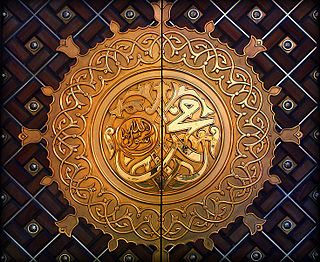Arabic language names have historically been based on a long naming system. Many people from the Arabic-speaking and also non-Arab Muslim countries have not had given/middle/family names but rather a chain of names. This system remains in use throughout the Arabic and Muslim worlds.
Abd Allah, also spelled Abdallah, Abdellah, Abdollah, Abdullah, Abdulla, Abdalla and many others, is an Arabic name meaning "Servant of God". It is built from the Arabic words ʻabd (عبد) and Allāh (الله). Although the first letter "a" in Allāh, as the first letter of the article al-, is usually unstressed in Arabic, it is usually stressed in the pronunciation of this name. The variants Abdollah and Abdullah represent the elision of this "a" following the "u" of the Classical Arabic nominative case. Abd Allah is one of many Arabic theophoric names, meaning servant of God. God's Follower is also a meaning of this name.

The Qadiriyya are members of the Sunni Qadiri tariqa. The tariqa got its name from Abdul Qadir Gilani, who was a Hanbali scholar from Gilan, Iran. The order relies strongly upon adherence to the fundamentals of Sunni Islamic law.
Yusuf is a male name meaning "God increases". It is the Arabic equivalent of the Hebrew name Yosef and the English name Joseph. It is widely used in many parts of the world by Arabs of all Abrahamic religions, including Middle Eastern Jews, Arab Christians, and Muslims.
In Arabic names, a nisba, also rendered as nesba or nesbat, is an adjective surname indicating the person's place of origin, ancestral tribe, or ancestry, used at the end of the name and occasionally ending in the suffix -iyy for males and -iyyah for females. Nisba, originally an Arabic word, has been passed to many other languages such as Turkish, Persian, Bengali and Urdu.
Shams al-Din is an Arabic personal name or title.

Muhammad, also spelled Muhammed, Muhamad, Mohammad, Mohammed, Mahammad, Mahammed, Mohamad, Mohamed, Mehmet, muham-mad or in a variety of other ways, is an Arabic given male name meaning 'Praiseworthy'. The name comes from the passive participle of the Arabic verb ḥammada (حَمَّدَ), meaning 'to praise', which itself comes from the triconsonantal Semitic root Ḥ-M-D. Believed to be the most popular name in the world, by 2014 it was estimated to have been given to 150 million men and boys.

Khawajah Syed Qutbuddin Maudood Chishti was an early day Sufi Saint, a successor to his father and master Abu Yusuf Bin Saamaan, twelfth link in the Sufi silsilah of Chishti Order, and the Master of Shareef Zandani. He was born around 430 Hijri in the city of Chisht. He initially received education from his father. He memorized the Qur'an by age 7 and completed his education when he was 16. His work includes two books, Minhaaj ul Arifeen and Khulaasat ul Shariah. He died in the month of Rajab at the age of 97 in 533 AH. He was buried at Chisht like many of the early Chishtiyya.
Abdul Wahhab is a male Muslim given name, and in modern usage, surname. It is built from the Arabic words ʻabd and al-Wahhāb, one of the names of God in the Qur'an, which give rise to the Muslim theophoric names. It means "servant of the all-giver".
Abdelrahman or Abd al-Rahman or Abdul Rahman or Abdurrahman or Abdrrahman is a male Arabic Muslim given name, and in modern usage, surname. It is built from the Arabic words Abd, al- and Rahman. The name means "servant of the most gracious", ar-Rahman being one of the names of God in the Qur'an, which give rise to the Muslim theophoric names.
Abdul Malik is an Arabic male given name and, in modern usage, surname. It is built from the Arabic words Abd, al- and Malik. The name means "servant of the King", in the Christian instance 'King' meaning 'King of Kings' as in Jesus Christ and in Islam, Al-Malik being one of the names of God in the Qur'an, which give rise to the Muslim theophoric names.
ʿAbd ar-Rabb Jaunpūrī was an Indian Muslim scholar, author and teacher. He was associated with Taiyuni reformist movement, founded by his grandfather Karamat Ali Jaunpuri, and succeeded his uncle Hafiz Ahmad Jaunpuri as the leader of the movement in 1899.